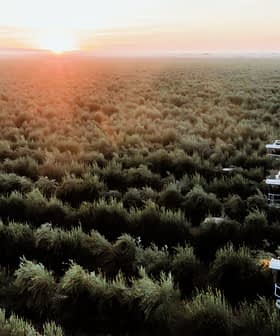South African Olive Farmers Feel the Heat as Wildfires Take Their Toll
South Africa's olive industry is set to take a blow from recent wildfires that have plagued the Western Cape region, an area home to most of the country's olive farms.
 Working on Fire International
Working on Fire InternationalFor a long time, South Africa has been a small but energetic player in the international olive oil market. Recent conditions might soon seriously impact the industry, as olive production in the country’s olive oil-making capital (the Western Cape) begins to suffer from the worst drought in over three decades bringing with it severe water shortages and deadly wildfires.
The Western Cape is home to over more than 90 percent of the estimated 1.6 million olive trees in South Africa, with many of the country’s 140 producers setting up shop in the region to taking advantage of the area’s Mediterranean climate of cold and wet winters and hot, dry summers.
Recent months have seen summer temperatures soar in the area, and with little respite from rain to be expected, many dams in the area have dropped to less than half full and are still dropping. It is estimated that residents of the City of Cape Town could run out of water in a matter of months, and strict water restrictions have been put in place by the government.
According to non-profit organization GreenCape’s 2016 Water Market Intelligence Report, most of South Africa’s water is used to irrigate the country’s agricultural land. While the Western Cape region’s 11.5 million agricultural hectares only account for about 12 percent of the available farmland in South Africa, it is responsible for producing up to 60 percent of the country’s agricultural exports, which means that foreign trade will be most affected by the drought.
Not only do farmers have to deal with water shortages, but with the increased hot and dry conditions fires have become another concern. With extreme dry heat and strong winds, even the smallest of fires can spread rapidly and with little warning.
Since the beginning of last month, over a thousand firefighters, volunteers and members of the South African National Defence Force have battled dozens of fires, spread out over thousands of hectares of vegetation. With water scarce, firefighting aircraft are using ocean water as an extreme measure to battle the flames.
The fires have caused emergency evacuations in many residential areas of the Cape, also severely impacting the area’s native environment. Many indigenous plants, trees, and insects were destroyed, as well as baboons, tortoises, and snakes residing in and around the mountain ranges in the Cape Peninsula.
In terms of olive farming, even the smallest loss in one of the larger estates is likely to have a significant impact on South Africa’s total olive harvest, as the total amount of land dedicated to olive production on a national scale is only about 2,600 hectares, says Karien Bezuidenhout, manager of SA Olive and Cape Flora SA.
Currently, two major Cape estates (the Buffet Olive Estate and Morgenster Estate) have reported significant losses, with Buffet losing over one third of their orchards to the fires.








